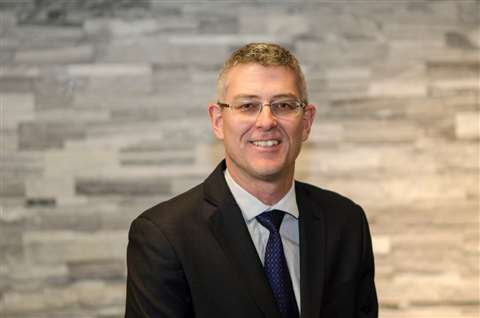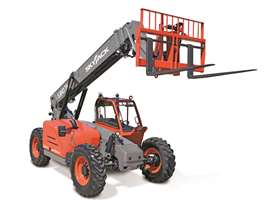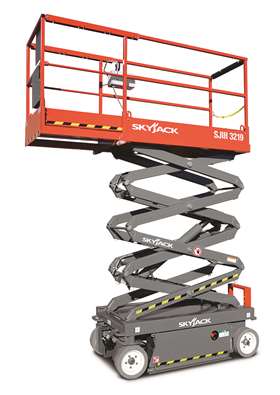A man of many hats
18 June 2019

Brad Boehler is a passionate and engaging individual. His involvement in the access and rental industries dates back to 2003, when he joined Skyjack as a product safety manager. From there he progressively held a variety of strategic positions – both within his company (where he is now president) to outside organizations (such as IPAF, where he is also now president.) He has been elected to the Association of Equipment Manufacturers’ CE sector board and the Serious Labs’ board as well as has having been chairman of the Scaffold & Access Industry Association’s access committee and the ANSI A92.6 committee. If there’s an industry hat Boehler isn’t wearing, there’s likely only a matter of time until it’s placed upon his head.
Boehler holds extensive knowledge of both Skyjack’s products and business model; he weathered the global recession with the company and moved from product safety to vice president of engineering to vice president of sales and marketing before being named interim president in 2011.
Seven years have passed since his official presidential appointment, seven years in which Boehler has used his expertise and insight to propel Skyjack as a major global player in the mobile elevating work platform and telehandler industries. Linamar, Skyjack’s parent company, has reported growth for nine consecutive years, of which Skyjack has contributed greatly to.
I sat down with Boehler during Bauma to talk about the company’s successes and plans, as well as his goals for his 2-year IPAF presidency. From expanding Skyjack’s production outside of Canada to changing how the industry is trained, Boehler better build a bigger hat rack.
ALH: How is the North American market fairing for access equipment right now and how do you think it’s going to be in the coming year?
Brad Boehler: Right now I think it’s in a similar mode to last year. We expect to see some growth still; there’s lots of work for the contracting base and there’s lots of capex that is being committed and from a variety of different customers of ours. Most of their projections are still somewhat optimistic. It might not be as large of growth as last year, but it’s still growth nevertheless. And I think there is a 12- to 18-month timeline where people have visibility to work. That’s a positive.
ALH: Other than scissor lifts, are there any other areas of the business that you’re seeing upticks with how are telehandlers?

Yeah, I would say telehandlers are still very, very active. That’s our biggest backlog and largest lead times are still on telehandlers.
ALH: How are tariffs affecting business?
For the most part, our supply chain is structured in such a way that the tariffs don’t really have any direct effect to us. There’s not really a great net impact from the tariffs, but I would say that the impact is really more the downstream effects of it. For instance, now, prices of almost everything, even in markets or in instances where there’s no tariffs involved, have gone up regardless. So, we’ve seen material costs increases and you know they have been significant. We’re struggling with trying to mitigate our costs increases and work on that. We did go to the market this year and part of last year with a price increase. We don’t like doing that, but the situation is what the situation is, and we have certainly seen material cost increases.
ALH: But despite the price increase and all that, you just posted phenomenal year-end results. The release said the increase came from strong market share gains for scissors. Are your units going somewhere else?
We’re just maintaining our position as a premier scissor manufacturer, which is sometimes hard. We think we’re being relatively successful in doing that, which is great.
ALH: A couple of years ago you were talking about expanding your production plant. Any, any further movement on that?
We’re working on expanding our production capabilities. Part of that is that we have begun manufacturing some equipment in Hungary again. There’s a Linamar plant there and in the past they have built electric scissors for us. When the recession came about, we brought back all of that; We had additional capacity in Canada and we didn’t see the need to build scissors in a Linamar plant elsewhere in the world at the time. We’re back at a point now where our capacity is pretty much exhausted in Canada.
ALH: Anything else Skyjack-related that we should touch upon before we talk about your IPAF presidency?
We expect to continue to grow and be more of the same, right? We’ve talked to a lot of customers here [at Bauma.] We’re building our customer base even more in the European marketplace. I see evidence of that this week [during Bauma] very much. We still have lots of potential in the Asian marketplace as well. If I go back a step, I do see that we’ve made some very positive strides with some very big companies in Europe and I think that bodes well. I can envision that we’ll continue to grow more in the European marketplace.
There’ll be more of the same: more organic product growth. I wouldn’t rule out that we might have an acquisition in one way, shape or form. There’s nothing that’s imminent or we’re brewing, but we continue to have discussions internally about how we grow and how we continue to grow, so all of those things are on the table.

ALH: Transitioning, you’ve been newly appointed as President of IPAF. Congratulations! What are your main goals and objectives over the next two years?
Ultimately, I want to ensure that the good things that are going on at IPAF come to a conclusion or to a steady state of process. Some of the things that we had started working on were apprenticeships and digital technologies. I want to ensure that we follow up on those and that we do our due diligence and we get to a place where we are continuing to promote safe and effective use of powered access in a variety of different ways. Right? There’s also talk about ensuring that we’re attracting good, young talent into the industry and giving them a viable career so that we can continue to evolve the industry.
I want to do all those things. I want to make sure that we continue and don’t lose sight of any of those plans and ideas. Maybe more personally to me is I just want to make sure that IPAF continues to exceed where they are today and being relevant to their membership. In some instances, I think the members get good value from IPAF. But there are some instances I’m aware of where members are not entirely happy. So I want to make sure that we hear them, we listen to them and we find a way to bring their concerns to the front and deal with them.
I would also like to see a bit more of an attitude in this culture where the members are the owners and the members have interests because the members are the really the only reason the organization exists in the first place.
And so we, as the staff of IPAF, need to ensure that we’re meeting those people’s needs and that we’re meeting them in a in a timely and effective manner. We want to make sure that everybody gets that message - that we do need to do everything we can for our membership.
IPAF’s done a good job of growing more internationally and growing out of just being a UK entity. I know when I joined IPAF 15 or 16 years ago, at that time the membership I think was 95 percent in the UK. Something like that.
Now, it’s over 60 percent outside the UK. That’s a great thing. Having said that though, I also want to make sure that the core membership in the UK feels that they’re getting their fair share of features and benefits and attention from IPAF.
So, there is that part of ensuring that you keep your base happy, content and serviced. But we also need to continue to grow the organization globally and ensure that as an industry, we continue to grow the safe use of our equipment.
I think we still continue to have a very, very large opportunity in the United States. We’re absolutely going to a focus on that and try and find a way to bring people in. I am taking advantage of my position within the industry as a manufacturer to be able to have conversations with people in a variety of different companies in North America. I’ve taken the ability even before I became President to make contact with some of those people. I met with some of them at the Rental Show and said, “Hey, I’m about to be the new President of IPAF and I want you to tell me your experience with IPAF to date. Tell me what you like, tell me what you don’t like, tell me what you would like to see.”
So, I’ve had a variety of those conversations and I think we’re going to try to find some ways to get membership, to get the large OEMs, and the large renters - and small renters for that matter - in the U.S. Marketplace to see IPAF as a member organization that can help them in a variety of ways and build that internal momentum.
Ebbe [Christensen] is now the chair of the North American Council and he’s being very energetic and bringing a lot of responsibilities to people there; to come to the council meetings and be prepared to work in between the council meetings on a variety of objectives for North America.
That’s a good thing for us as well and we need to support that and just go out and encourage people to be members, show them why they should be numbers. We’ve got some good things that we can point to. We’ve got a partnership with United Rentals now. That model can translate to a variety of other rental companies. Specifically within Skyjack, we’ve been working to bring new people into the training end of it.
On a large continent like North America, it’s hard to bring people from across the country to one or two places [for training.] It’s much easier with e-learning; it doesn’t matter where you are, you can do the theoretical portion of the course online. What we’ve been working on with rental companies of various sizes is bringing them into the fold to be practical evaluators. Because they do have knowledgeable people on the ground all over the continent. And so Skyjack’s kind of helping them along by administering the program under our training centers and to allow them to then be our practical evaluators on the ground. I think we’re going to see this come to fruition soon. What I see that as is a gateway model to people understanding IPAF better and coming into the fold by saying, “Okay, we can do training for people. We want to do training for people. It’s easy to do this now through Skyjack and IPAF.” Then, eventually, when they get to a point where they’re successful at doing that and they get to a certain volume where it doesn’t make any sense to do it through Skyjack anymore, then they become an actual training center themselves. I think that’s good for everyone all around.
We did a member survey satisfaction survey last year. When the results came back, one very pertinent result for me was that a question for the North American marketplace that asked, “Why are you not a member of IPAF?”
There was a variety of answers and they were broken out regionally. There were UK answers, there were Europe outside of UK answers, there were North American answers and there were Asian answers. And it was a very interesting response in the North American marketplace to, “Why are you not an IPAF member?” The leading response in the North American marketplace was, “I don’t know who IPAF is.”
That’s a problem. We need to find ways to ensure that more people understand who IPAF is and so we’re working with United Rentals to try and communicate to their staff internally because they are offering the training, but it’s kind of in a limited circumstance through the United Academy. So, I’m not sure that the individual branches really understand still who IPAF is. So, we’re working on communication plans.
We’re also working on other plans to get it to the grassroots of the rental organization and other places so that we at least have an understanding of who IPAF is and what they do. It’s not all related to training. Ultimately there are a lot of other benefits there such as being involved in the standards development. To a certain extent, they’ve been almost “too successful” in the standards development in North America because some of the feedback that I have heard is that, “We’re getting a new standard. We’re getting load sensing. We’re getting all of this and it’s all Tony Groat’s [IPAF North American regional manager] fault because he’s been at a very leading part of that as an IPAF representative and energetic member.
So, I think those people need to understand that this was going to happen regardless. It was not driven by IPAF in any way, shape or form, but IPAF did take a very strong leadership position in ensuring that it happened and ensuring that it happened in the best possible manner for the greater good of our industry and the IPAF membership.
